Melania and Donald Trump and Emanuel and Brigitte Macron: are these situations common? No, I’m not talking about being president or being a billionaire (or both), I’m talking about marrying someone much older (or younger). In other words, are there many cougars or manthers (which is apparently how we should refer to men going for much younger women) in the jungle? Let’s have a look at the data.
Man marrying younger women?
The fact that man tend to marry younger women is a stereotype but it is grounded in truth. If we look at the age difference distribution between husbands and wives, and compare it to a random normal distribution, we immediately see that wives tend to be younger than their husbands. However the difference in ages is usually 0-10 years, and most people actually marry within + or – 5 years from their own age. In only 0.3% of cases are wives 20 or more years older than their husbands, and only 2% of married man are over two decades older than their spouse.
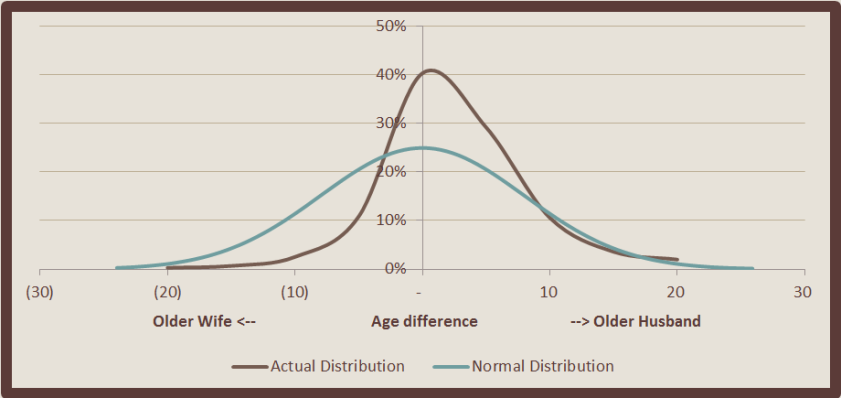
Does that change with age? Obviously, when you are 20, it is very hard (not to mention illegal) to marry someone 10 years younger than you, and when you are 90 it is very unlikely you will find a dashing 100 year old to take to the altar. If we look at the data, we can however notice two distinct patterns.
If we consider marriages by the wife’s age, we can see younger women prefer older guys. But as they get older they tend to go for younger partners: 31% of under-20 year old women, for example, marry guys that are over 10 years older than them, and this drops to 14% by the time they are 60.
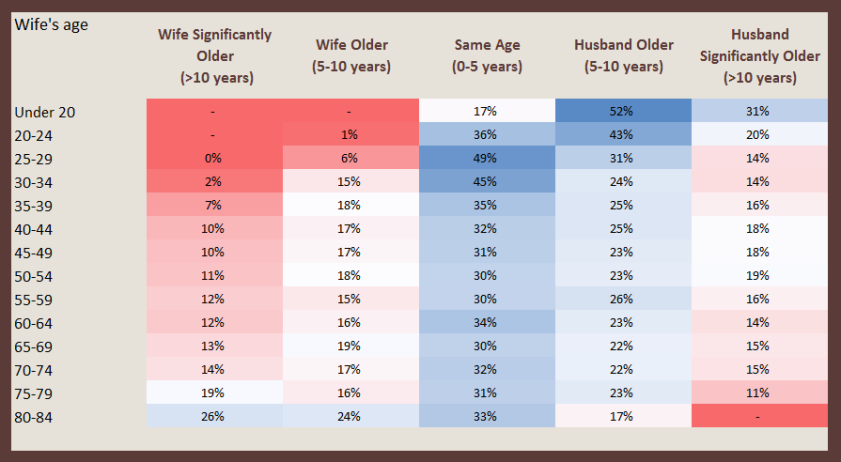
Guys on the other hand, maintain a preference for younger women. If we segment the data according to husbands’ ages, only about 2-3% of any age cohort marry women significantly older than they are.
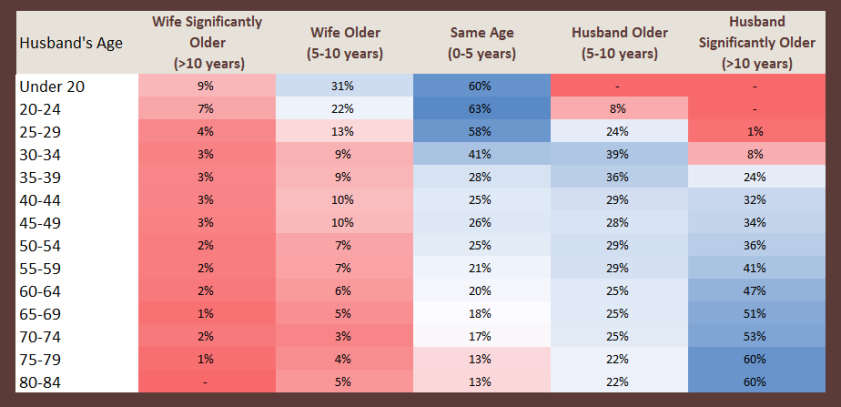
Has this changed over time? That is, did people use to marry with wider (or narrower) age gaps in the past compared to today? It does not seem to be the case. The mean age difference has remained stable, although the dispersion has slightly increased. It appears that there is a higher number of marriages where either the husband or wife are significantly older than their partner. This could however be simply due to increasing life expectancy.

Do these marriages last?
Do people who marry a partner of their same age stay together for longer compared to people marrying someone much older or younger?
If we look at the overall proportions, we can see that the percentage of marriages and divorces by age difference are quite close. For example, 41% of people marry someone who’s up to 5 years younger or older than they are, and out of 100 divorces, 42 are between people within 5 years of age of each other.
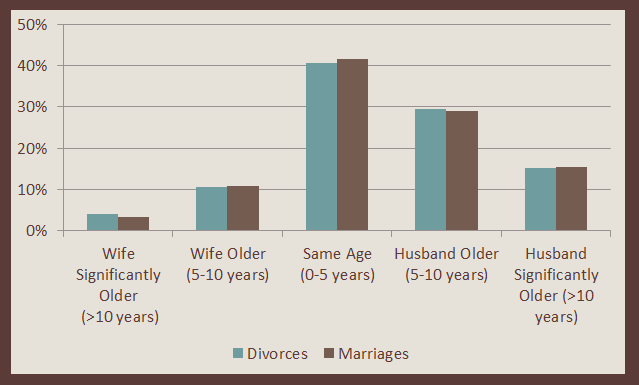
According to a more rigorous 2008 study from the ONS (Wilson and Smallwood: “Age Differences at Marriage and Divorce”.) there does not seem to be a difference in the proportion of marriages that have ended in divorce when looking at age difference, even when accounting for mortality. In couples where one of the partners is significantly older, the marriage may be more likely to end because of their death and not because of divorce, and this could skew the numbers, showing a lower proportion of divorces than would be expected. However this does not seem to be the case.
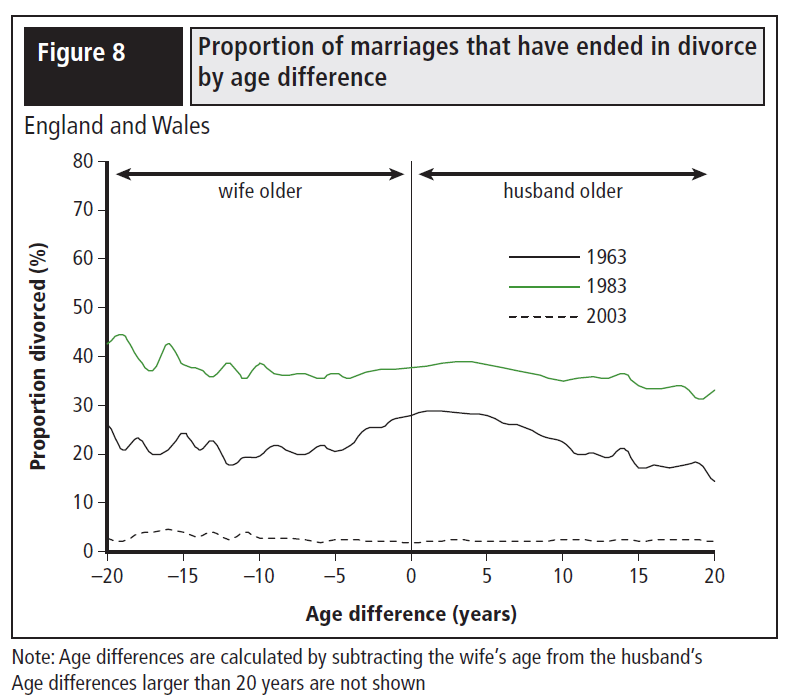
What about civil partnerships?
Since civil partnerships have been recognised in the UK in 2005, the ONS has collected data on both partnerships and dissolutions. Are there significant differences between ages of partners in same sex couples compared to heterosexual couples?
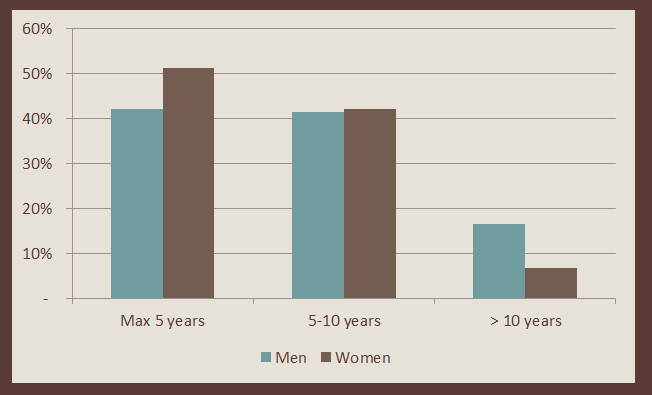
Lesbian couples tend to be closer in age than male gay couples, with up to 16% of gay male couples having one of the partners be more than 10 years older than the other, compared to only 7% for gay females couples.
As they age, lesbians continue to form civil partnerships with someone close to their own age, while guys show an increasing preference for younger partners: 48% of gay men marry someone of their own age when they are 35 to 45 year old, however this drops to 24% by the time they are 55.
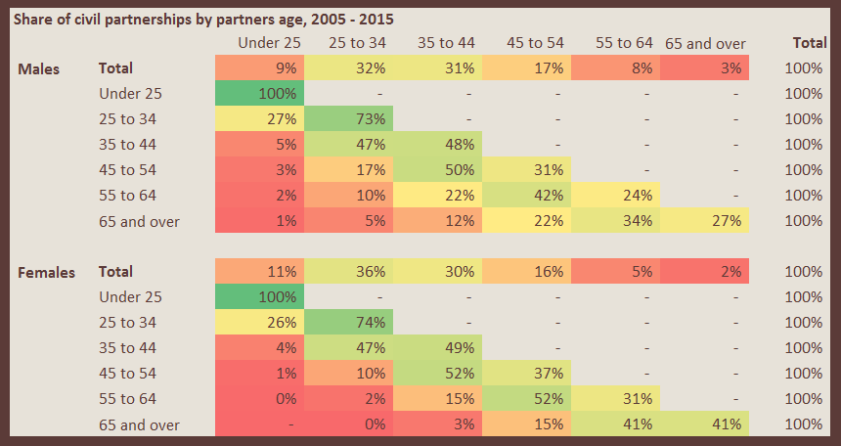
Finally, is there a correlation between age difference and divorce rates in same sex couples? It appears that there is a higher rate of divorce for couples closer in age (when compared to the “marriage rate”), although conclusions may only be relevant for this particular dataset and cannot be generalized.

So what?
Other than having some trivia to bore guests at dinner tables with, what are the implications from this analysis?
- Guys tend to marry younger women, regardless of how old they are
- Girls prefer more mature man, unless they are cougars—ehm, older, in which case they go for a boy toy
- Couples with larger age difference do not divorce more frequently (maybe the younger party just waits for the other to drop dead and run away with the inheritance)
- There are larger age differences between gay man couples than between lesbian couples
- Same sex couples with lower age difference appear to “divorce” more frequently
There is one remaining question: why? To address that, we would need data on a number of parameters for couples, chiefly (I think) on income and education. Until I can get my hands on that dataset, the question will remain unanswered (or just a google search away if you are curious).
Caveats and sources
- I tried diversifying my sources a bit, and was looking at Eurostat and American census data. However I could not find easily accessible datasets until I went back to my favourite source: the UK Office for National Statistics. And, lo and behold, the data was there.
- Some of the statistics are more robust and generalizable than others, simply because the sample size is much larger for marriages happening between the ages of 25 and 35 than for marriages happening when the bride and groom are over 60.
- The same comment holds true for civil partnership, where the sample size is much smaller and conclusion may not be as broadly applicable as with heterosexual marriages.
- The data on civil partnerships dissolutions is not as robust as for divorces in heterosexual couples, with a total of only 6000 civil partnership dissolutions over 10 years